Incoterms and Maritime Law Cases
VerifiedAdded on 2020/03/04
|13
|3191
|135
AI Summary
This assignment delves into the world of Incoterms within the framework of maritime law. It examines various scholarly articles and legal precedents that shed light on the practical applications and interpretations of Incoterms in resolving disputes related to international shipping contracts. The analysis covers topics such as CIF contracts, Hague-Visby Rules, and the Rotterdam Rules, highlighting their influence on seller obligations, risk allocation, and liability determination in maritime trade.
Contribute Materials
Your contribution can guide someone’s learning journey. Share your
documents today.
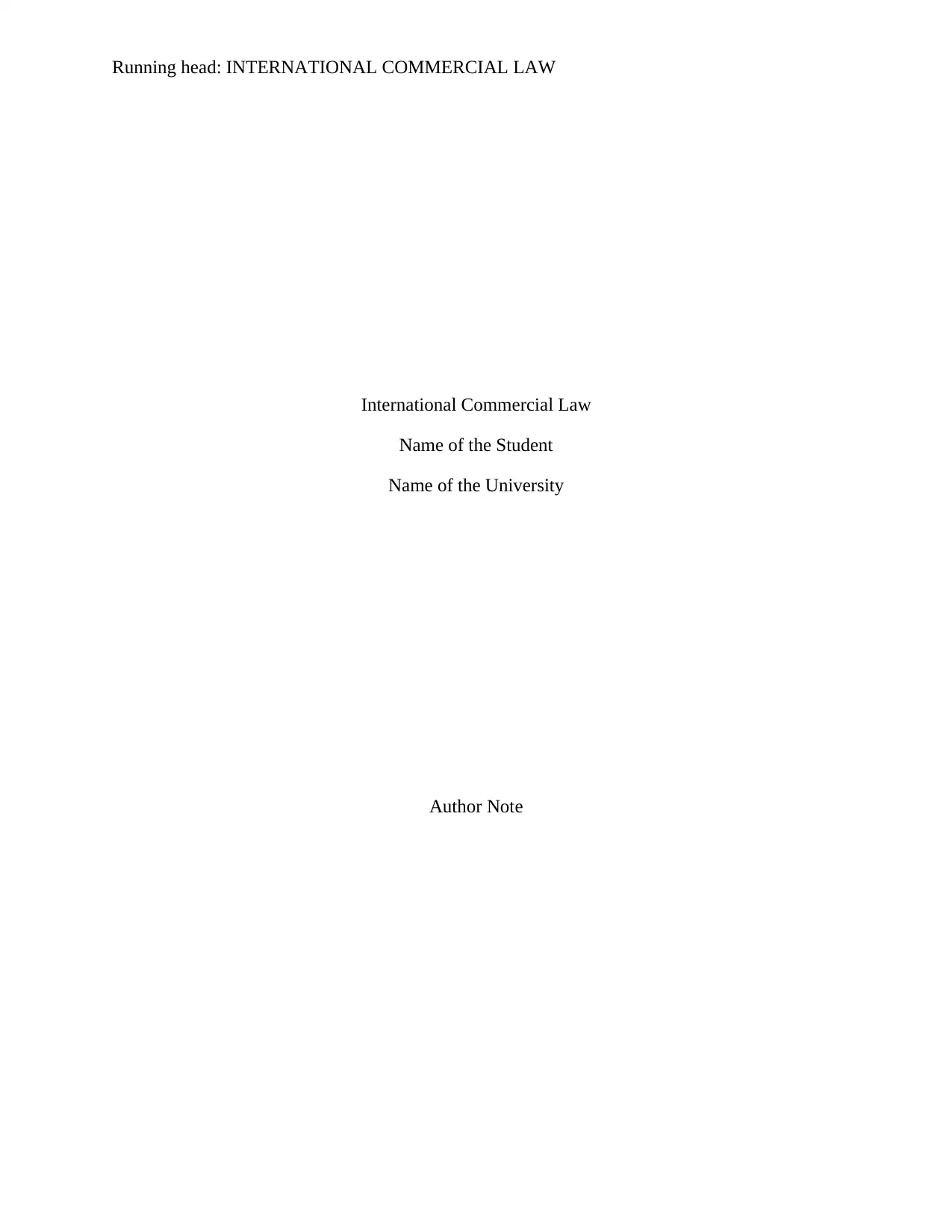
Running head: INTERNATIONAL COMMERCIAL LAW
International Commercial Law
Name of the Student
Name of the University
Author Note
International Commercial Law
Name of the Student
Name of the University
Author Note
Secure Best Marks with AI Grader
Need help grading? Try our AI Grader for instant feedback on your assignments.
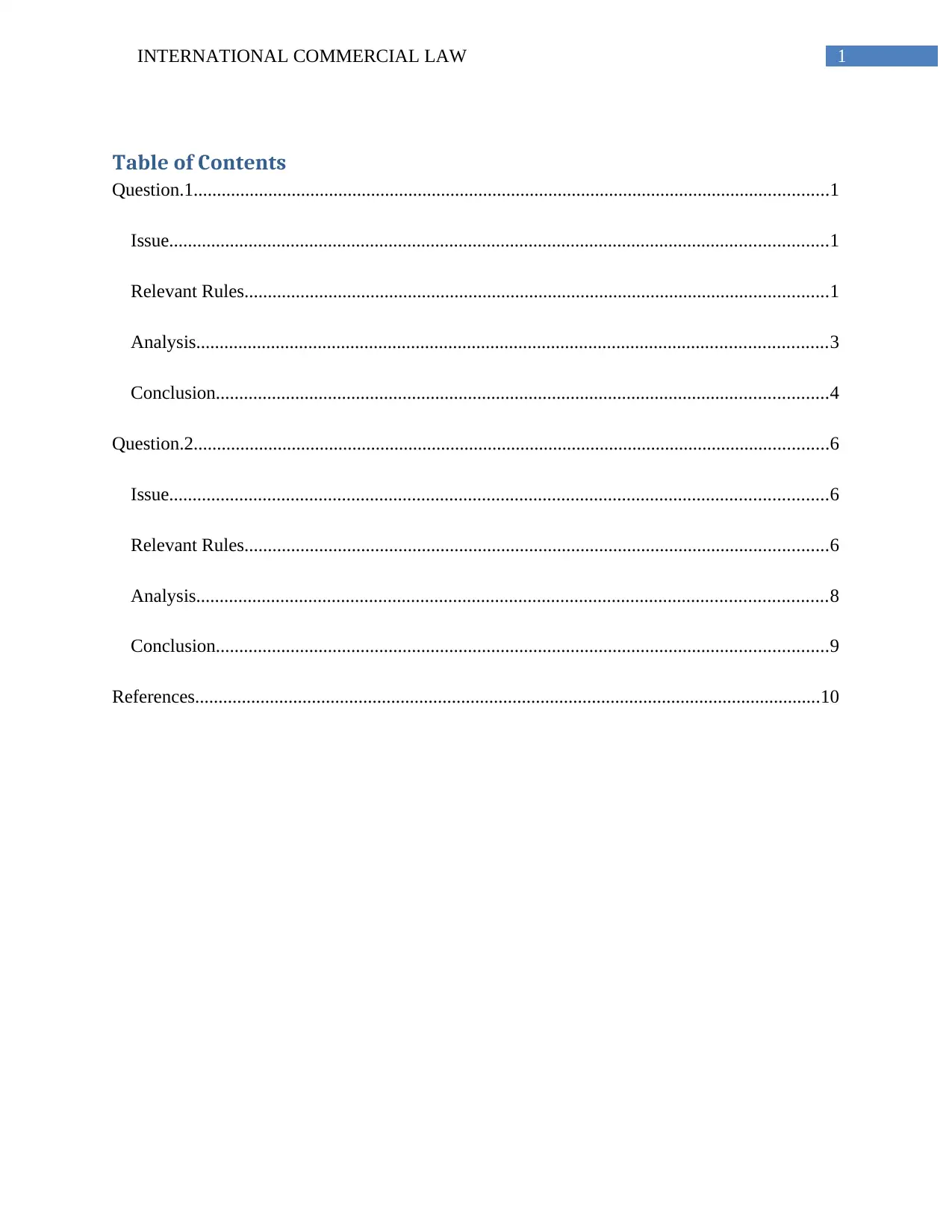
1INTERNATIONAL COMMERCIAL LAW
Table of Contents
Question.1........................................................................................................................................1
Issue.............................................................................................................................................1
Relevant Rules.............................................................................................................................1
Analysis.......................................................................................................................................3
Conclusion...................................................................................................................................4
Question.2........................................................................................................................................6
Issue.............................................................................................................................................6
Relevant Rules.............................................................................................................................6
Analysis.......................................................................................................................................8
Conclusion...................................................................................................................................9
References......................................................................................................................................10
Table of Contents
Question.1........................................................................................................................................1
Issue.............................................................................................................................................1
Relevant Rules.............................................................................................................................1
Analysis.......................................................................................................................................3
Conclusion...................................................................................................................................4
Question.2........................................................................................................................................6
Issue.............................................................................................................................................6
Relevant Rules.............................................................................................................................6
Analysis.......................................................................................................................................8
Conclusion...................................................................................................................................9
References......................................................................................................................................10
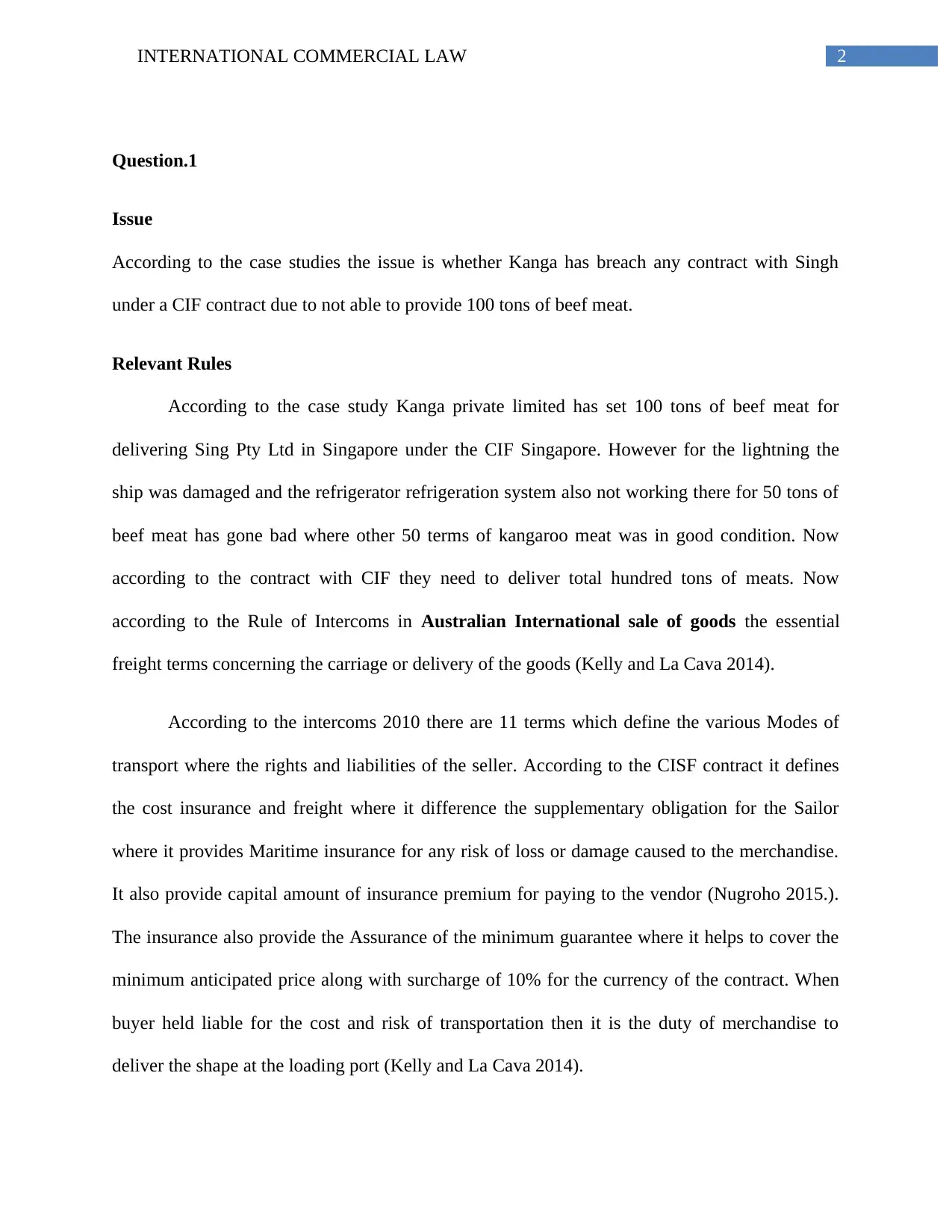
2INTERNATIONAL COMMERCIAL LAW
Question.1
Issue
According to the case studies the issue is whether Kanga has breach any contract with Singh
under a CIF contract due to not able to provide 100 tons of beef meat.
Relevant Rules
According to the case study Kanga private limited has set 100 tons of beef meat for
delivering Sing Pty Ltd in Singapore under the CIF Singapore. However for the lightning the
ship was damaged and the refrigerator refrigeration system also not working there for 50 tons of
beef meat has gone bad where other 50 terms of kangaroo meat was in good condition. Now
according to the contract with CIF they need to deliver total hundred tons of meats. Now
according to the Rule of Intercoms in Australian International sale of goods the essential
freight terms concerning the carriage or delivery of the goods (Kelly and La Cava 2014).
According to the intercoms 2010 there are 11 terms which define the various Modes of
transport where the rights and liabilities of the seller. According to the CISF contract it defines
the cost insurance and freight where it difference the supplementary obligation for the Sailor
where it provides Maritime insurance for any risk of loss or damage caused to the merchandise.
It also provide capital amount of insurance premium for paying to the vendor (Nugroho 2015.).
The insurance also provide the Assurance of the minimum guarantee where it helps to cover the
minimum anticipated price along with surcharge of 10% for the currency of the contract. When
buyer held liable for the cost and risk of transportation then it is the duty of merchandise to
deliver the shape at the loading port (Kelly and La Cava 2014).
Question.1
Issue
According to the case studies the issue is whether Kanga has breach any contract with Singh
under a CIF contract due to not able to provide 100 tons of beef meat.
Relevant Rules
According to the case study Kanga private limited has set 100 tons of beef meat for
delivering Sing Pty Ltd in Singapore under the CIF Singapore. However for the lightning the
ship was damaged and the refrigerator refrigeration system also not working there for 50 tons of
beef meat has gone bad where other 50 terms of kangaroo meat was in good condition. Now
according to the contract with CIF they need to deliver total hundred tons of meats. Now
according to the Rule of Intercoms in Australian International sale of goods the essential
freight terms concerning the carriage or delivery of the goods (Kelly and La Cava 2014).
According to the intercoms 2010 there are 11 terms which define the various Modes of
transport where the rights and liabilities of the seller. According to the CISF contract it defines
the cost insurance and freight where it difference the supplementary obligation for the Sailor
where it provides Maritime insurance for any risk of loss or damage caused to the merchandise.
It also provide capital amount of insurance premium for paying to the vendor (Nugroho 2015.).
The insurance also provide the Assurance of the minimum guarantee where it helps to cover the
minimum anticipated price along with surcharge of 10% for the currency of the contract. When
buyer held liable for the cost and risk of transportation then it is the duty of merchandise to
deliver the shape at the loading port (Kelly and La Cava 2014).
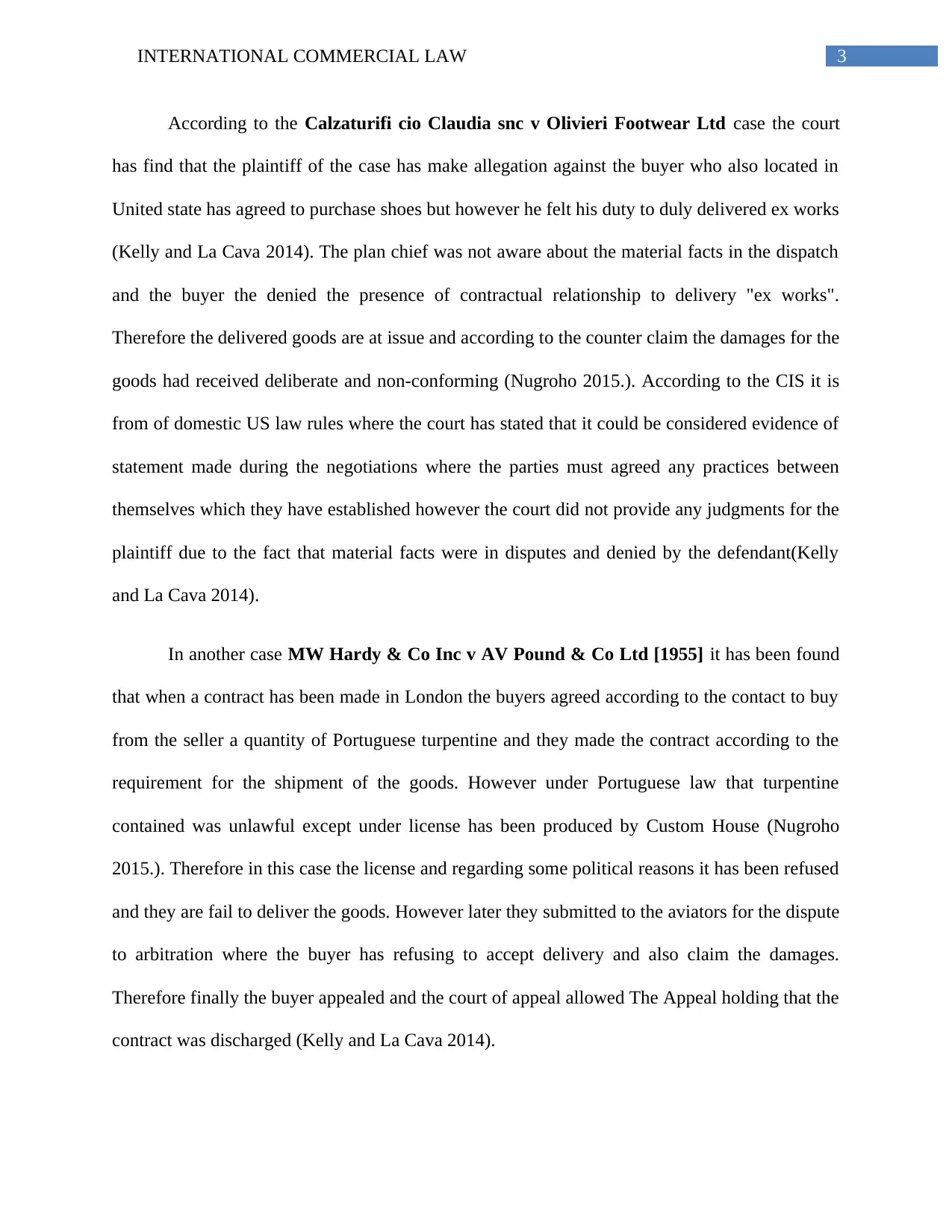
3INTERNATIONAL COMMERCIAL LAW
According to the Calzaturifi cio Claudia snc v Olivieri Footwear Ltd case the court
has find that the plaintiff of the case has make allegation against the buyer who also located in
United state has agreed to purchase shoes but however he felt his duty to duly delivered ex works
(Kelly and La Cava 2014). The plan chief was not aware about the material facts in the dispatch
and the buyer the denied the presence of contractual relationship to delivery "ex works".
Therefore the delivered goods are at issue and according to the counter claim the damages for the
goods had received deliberate and non-conforming (Nugroho 2015.). According to the CIS it is
from of domestic US law rules where the court has stated that it could be considered evidence of
statement made during the negotiations where the parties must agreed any practices between
themselves which they have established however the court did not provide any judgments for the
plaintiff due to the fact that material facts were in disputes and denied by the defendant(Kelly
and La Cava 2014).
In another case MW Hardy & Co Inc v AV Pound & Co Ltd [1955] it has been found
that when a contract has been made in London the buyers agreed according to the contact to buy
from the seller a quantity of Portuguese turpentine and they made the contract according to the
requirement for the shipment of the goods. However under Portuguese law that turpentine
contained was unlawful except under license has been produced by Custom House (Nugroho
2015.). Therefore in this case the license and regarding some political reasons it has been refused
and they are fail to deliver the goods. However later they submitted to the aviators for the dispute
to arbitration where the buyer has refusing to accept delivery and also claim the damages.
Therefore finally the buyer appealed and the court of appeal allowed The Appeal holding that the
contract was discharged (Kelly and La Cava 2014).
According to the Calzaturifi cio Claudia snc v Olivieri Footwear Ltd case the court
has find that the plaintiff of the case has make allegation against the buyer who also located in
United state has agreed to purchase shoes but however he felt his duty to duly delivered ex works
(Kelly and La Cava 2014). The plan chief was not aware about the material facts in the dispatch
and the buyer the denied the presence of contractual relationship to delivery "ex works".
Therefore the delivered goods are at issue and according to the counter claim the damages for the
goods had received deliberate and non-conforming (Nugroho 2015.). According to the CIS it is
from of domestic US law rules where the court has stated that it could be considered evidence of
statement made during the negotiations where the parties must agreed any practices between
themselves which they have established however the court did not provide any judgments for the
plaintiff due to the fact that material facts were in disputes and denied by the defendant(Kelly
and La Cava 2014).
In another case MW Hardy & Co Inc v AV Pound & Co Ltd [1955] it has been found
that when a contract has been made in London the buyers agreed according to the contact to buy
from the seller a quantity of Portuguese turpentine and they made the contract according to the
requirement for the shipment of the goods. However under Portuguese law that turpentine
contained was unlawful except under license has been produced by Custom House (Nugroho
2015.). Therefore in this case the license and regarding some political reasons it has been refused
and they are fail to deliver the goods. However later they submitted to the aviators for the dispute
to arbitration where the buyer has refusing to accept delivery and also claim the damages.
Therefore finally the buyer appealed and the court of appeal allowed The Appeal holding that the
contract was discharged (Kelly and La Cava 2014).
Secure Best Marks with AI Grader
Need help grading? Try our AI Grader for instant feedback on your assignments.
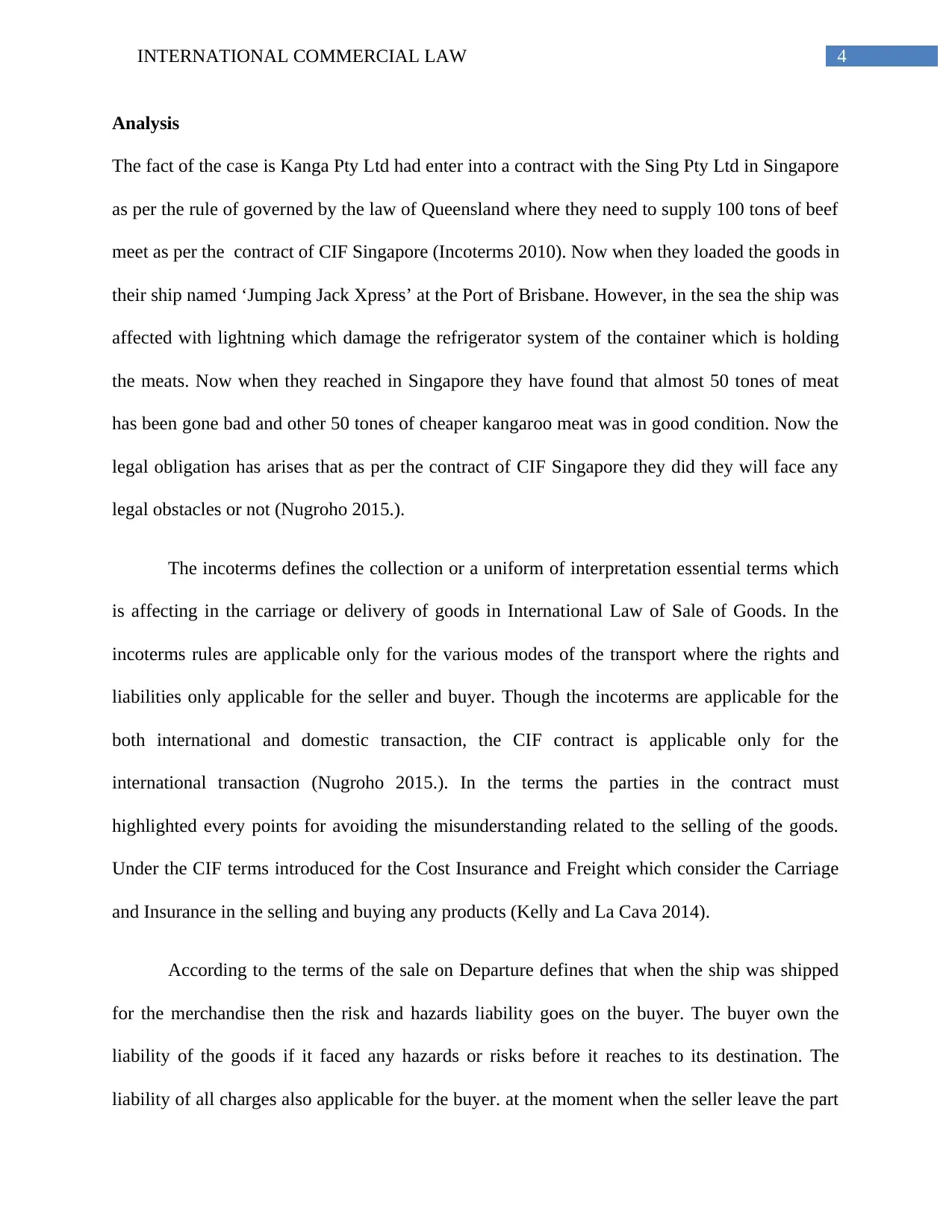
4INTERNATIONAL COMMERCIAL LAW
Analysis
The fact of the case is Kanga Pty Ltd had enter into a contract with the Sing Pty Ltd in Singapore
as per the rule of governed by the law of Queensland where they need to supply 100 tons of beef
meet as per the contract of CIF Singapore (Incoterms 2010). Now when they loaded the goods in
their ship named ‘Jumping Jack Xpress’ at the Port of Brisbane. However, in the sea the ship was
affected with lightning which damage the refrigerator system of the container which is holding
the meats. Now when they reached in Singapore they have found that almost 50 tones of meat
has been gone bad and other 50 tones of cheaper kangaroo meat was in good condition. Now the
legal obligation has arises that as per the contract of CIF Singapore they did they will face any
legal obstacles or not (Nugroho 2015.).
The incoterms defines the collection or a uniform of interpretation essential terms which
is affecting in the carriage or delivery of goods in International Law of Sale of Goods. In the
incoterms rules are applicable only for the various modes of the transport where the rights and
liabilities only applicable for the seller and buyer. Though the incoterms are applicable for the
both international and domestic transaction, the CIF contract is applicable only for the
international transaction (Nugroho 2015.). In the terms the parties in the contract must
highlighted every points for avoiding the misunderstanding related to the selling of the goods.
Under the CIF terms introduced for the Cost Insurance and Freight which consider the Carriage
and Insurance in the selling and buying any products (Kelly and La Cava 2014).
According to the terms of the sale on Departure defines that when the ship was shipped
for the merchandise then the risk and hazards liability goes on the buyer. The buyer own the
liability of the goods if it faced any hazards or risks before it reaches to its destination. The
liability of all charges also applicable for the buyer. at the moment when the seller leave the part
Analysis
The fact of the case is Kanga Pty Ltd had enter into a contract with the Sing Pty Ltd in Singapore
as per the rule of governed by the law of Queensland where they need to supply 100 tons of beef
meet as per the contract of CIF Singapore (Incoterms 2010). Now when they loaded the goods in
their ship named ‘Jumping Jack Xpress’ at the Port of Brisbane. However, in the sea the ship was
affected with lightning which damage the refrigerator system of the container which is holding
the meats. Now when they reached in Singapore they have found that almost 50 tones of meat
has been gone bad and other 50 tones of cheaper kangaroo meat was in good condition. Now the
legal obligation has arises that as per the contract of CIF Singapore they did they will face any
legal obstacles or not (Nugroho 2015.).
The incoterms defines the collection or a uniform of interpretation essential terms which
is affecting in the carriage or delivery of goods in International Law of Sale of Goods. In the
incoterms rules are applicable only for the various modes of the transport where the rights and
liabilities only applicable for the seller and buyer. Though the incoterms are applicable for the
both international and domestic transaction, the CIF contract is applicable only for the
international transaction (Nugroho 2015.). In the terms the parties in the contract must
highlighted every points for avoiding the misunderstanding related to the selling of the goods.
Under the CIF terms introduced for the Cost Insurance and Freight which consider the Carriage
and Insurance in the selling and buying any products (Kelly and La Cava 2014).
According to the terms of the sale on Departure defines that when the ship was shipped
for the merchandise then the risk and hazards liability goes on the buyer. The buyer own the
liability of the goods if it faced any hazards or risks before it reaches to its destination. The
liability of all charges also applicable for the buyer. at the moment when the seller leave the part
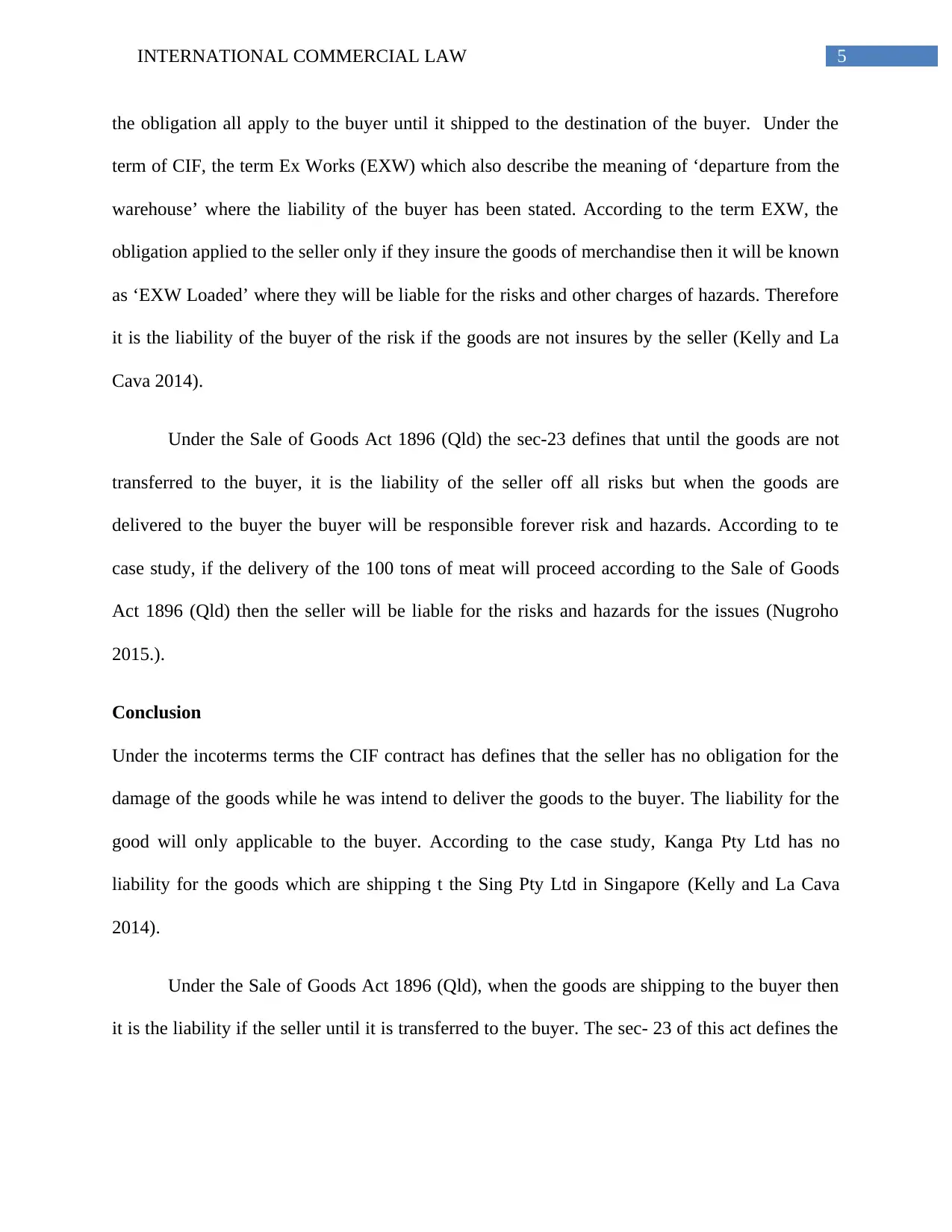
5INTERNATIONAL COMMERCIAL LAW
the obligation all apply to the buyer until it shipped to the destination of the buyer. Under the
term of CIF, the term Ex Works (EXW) which also describe the meaning of ‘departure from the
warehouse’ where the liability of the buyer has been stated. According to the term EXW, the
obligation applied to the seller only if they insure the goods of merchandise then it will be known
as ‘EXW Loaded’ where they will be liable for the risks and other charges of hazards. Therefore
it is the liability of the buyer of the risk if the goods are not insures by the seller (Kelly and La
Cava 2014).
Under the Sale of Goods Act 1896 (Qld) the sec-23 defines that until the goods are not
transferred to the buyer, it is the liability of the seller off all risks but when the goods are
delivered to the buyer the buyer will be responsible forever risk and hazards. According to te
case study, if the delivery of the 100 tons of meat will proceed according to the Sale of Goods
Act 1896 (Qld) then the seller will be liable for the risks and hazards for the issues (Nugroho
2015.).
Conclusion
Under the incoterms terms the CIF contract has defines that the seller has no obligation for the
damage of the goods while he was intend to deliver the goods to the buyer. The liability for the
good will only applicable to the buyer. According to the case study, Kanga Pty Ltd has no
liability for the goods which are shipping t the Sing Pty Ltd in Singapore (Kelly and La Cava
2014).
Under the Sale of Goods Act 1896 (Qld), when the goods are shipping to the buyer then
it is the liability if the seller until it is transferred to the buyer. The sec- 23 of this act defines the
the obligation all apply to the buyer until it shipped to the destination of the buyer. Under the
term of CIF, the term Ex Works (EXW) which also describe the meaning of ‘departure from the
warehouse’ where the liability of the buyer has been stated. According to the term EXW, the
obligation applied to the seller only if they insure the goods of merchandise then it will be known
as ‘EXW Loaded’ where they will be liable for the risks and other charges of hazards. Therefore
it is the liability of the buyer of the risk if the goods are not insures by the seller (Kelly and La
Cava 2014).
Under the Sale of Goods Act 1896 (Qld) the sec-23 defines that until the goods are not
transferred to the buyer, it is the liability of the seller off all risks but when the goods are
delivered to the buyer the buyer will be responsible forever risk and hazards. According to te
case study, if the delivery of the 100 tons of meat will proceed according to the Sale of Goods
Act 1896 (Qld) then the seller will be liable for the risks and hazards for the issues (Nugroho
2015.).
Conclusion
Under the incoterms terms the CIF contract has defines that the seller has no obligation for the
damage of the goods while he was intend to deliver the goods to the buyer. The liability for the
good will only applicable to the buyer. According to the case study, Kanga Pty Ltd has no
liability for the goods which are shipping t the Sing Pty Ltd in Singapore (Kelly and La Cava
2014).
Under the Sale of Goods Act 1896 (Qld), when the goods are shipping to the buyer then
it is the liability if the seller until it is transferred to the buyer. The sec- 23 of this act defines the
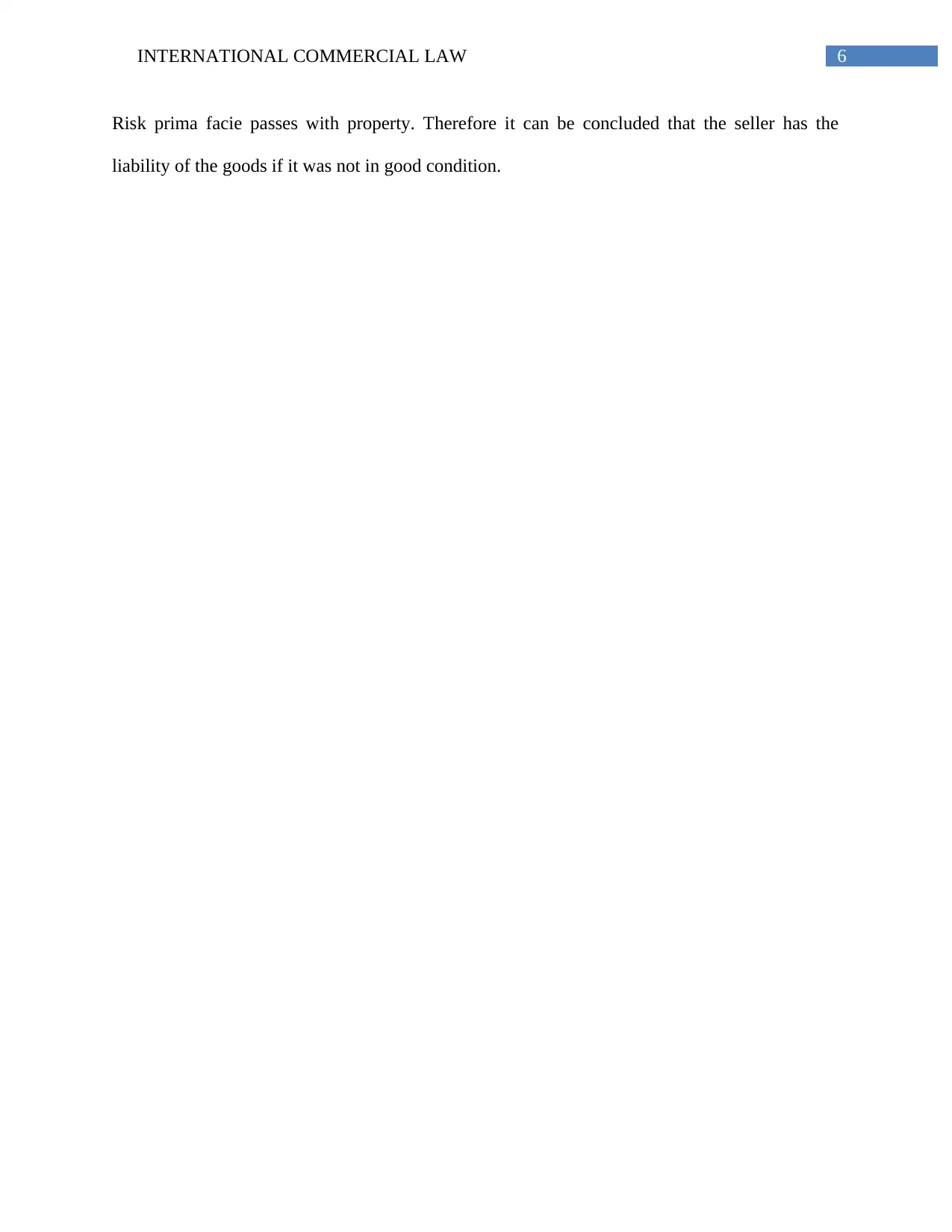
6INTERNATIONAL COMMERCIAL LAW
Risk prima facie passes with property. Therefore it can be concluded that the seller has the
liability of the goods if it was not in good condition.
Risk prima facie passes with property. Therefore it can be concluded that the seller has the
liability of the goods if it was not in good condition.
Paraphrase This Document
Need a fresh take? Get an instant paraphrase of this document with our AI Paraphraser
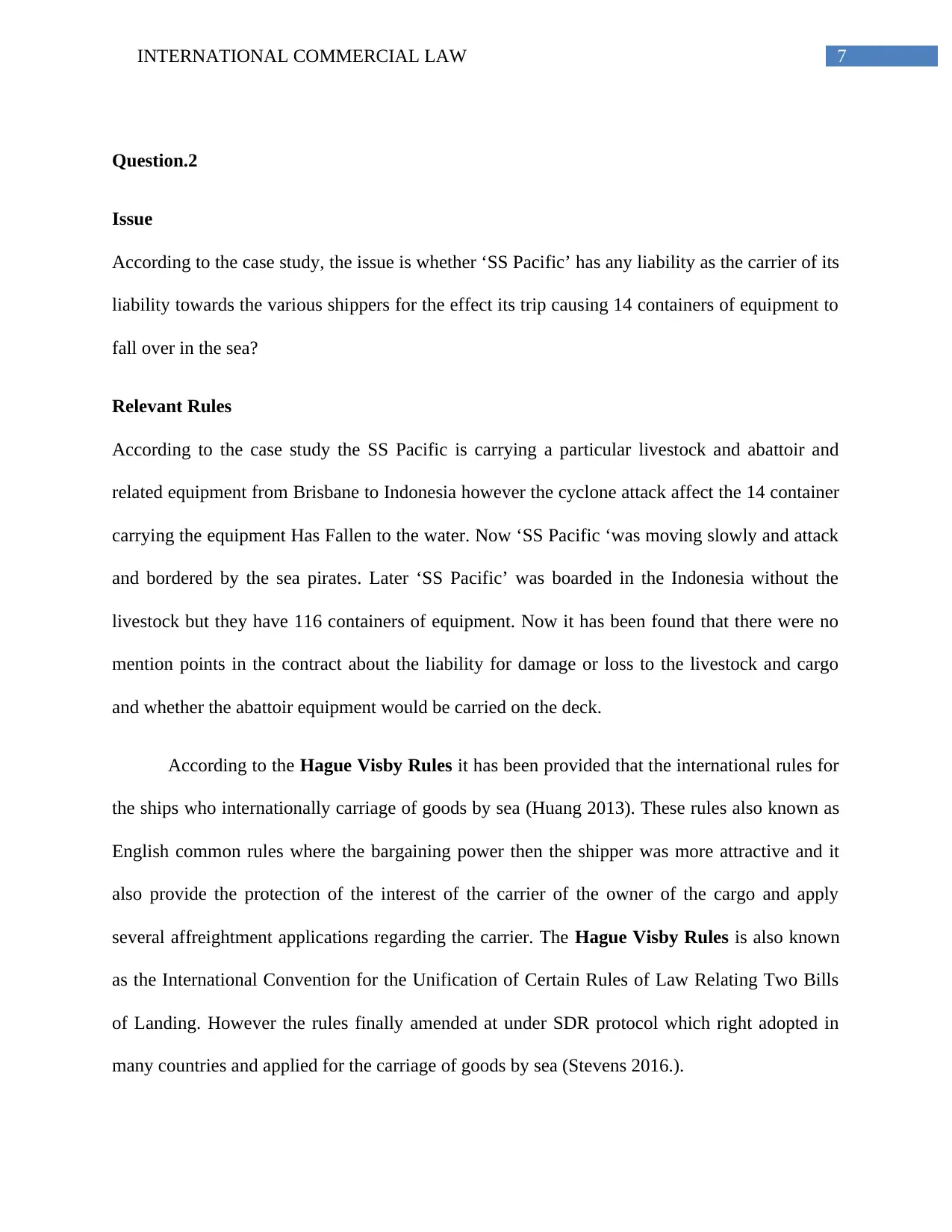
7INTERNATIONAL COMMERCIAL LAW
Question.2
Issue
According to the case study, the issue is whether ‘SS Pacific’ has any liability as the carrier of its
liability towards the various shippers for the effect its trip causing 14 containers of equipment to
fall over in the sea?
Relevant Rules
According to the case study the SS Pacific is carrying a particular livestock and abattoir and
related equipment from Brisbane to Indonesia however the cyclone attack affect the 14 container
carrying the equipment Has Fallen to the water. Now ‘SS Pacific ‘was moving slowly and attack
and bordered by the sea pirates. Later ‘SS Pacific’ was boarded in the Indonesia without the
livestock but they have 116 containers of equipment. Now it has been found that there were no
mention points in the contract about the liability for damage or loss to the livestock and cargo
and whether the abattoir equipment would be carried on the deck.
According to the Hague Visby Rules it has been provided that the international rules for
the ships who internationally carriage of goods by sea (Huang 2013). These rules also known as
English common rules where the bargaining power then the shipper was more attractive and it
also provide the protection of the interest of the carrier of the owner of the cargo and apply
several affreightment applications regarding the carrier. The Hague Visby Rules is also known
as the International Convention for the Unification of Certain Rules of Law Relating Two Bills
of Landing. However the rules finally amended at under SDR protocol which right adopted in
many countries and applied for the carriage of goods by sea (Stevens 2016.).
Question.2
Issue
According to the case study, the issue is whether ‘SS Pacific’ has any liability as the carrier of its
liability towards the various shippers for the effect its trip causing 14 containers of equipment to
fall over in the sea?
Relevant Rules
According to the case study the SS Pacific is carrying a particular livestock and abattoir and
related equipment from Brisbane to Indonesia however the cyclone attack affect the 14 container
carrying the equipment Has Fallen to the water. Now ‘SS Pacific ‘was moving slowly and attack
and bordered by the sea pirates. Later ‘SS Pacific’ was boarded in the Indonesia without the
livestock but they have 116 containers of equipment. Now it has been found that there were no
mention points in the contract about the liability for damage or loss to the livestock and cargo
and whether the abattoir equipment would be carried on the deck.
According to the Hague Visby Rules it has been provided that the international rules for
the ships who internationally carriage of goods by sea (Huang 2013). These rules also known as
English common rules where the bargaining power then the shipper was more attractive and it
also provide the protection of the interest of the carrier of the owner of the cargo and apply
several affreightment applications regarding the carrier. The Hague Visby Rules is also known
as the International Convention for the Unification of Certain Rules of Law Relating Two Bills
of Landing. However the rules finally amended at under SDR protocol which right adopted in
many countries and applied for the carriage of goods by sea (Stevens 2016.).
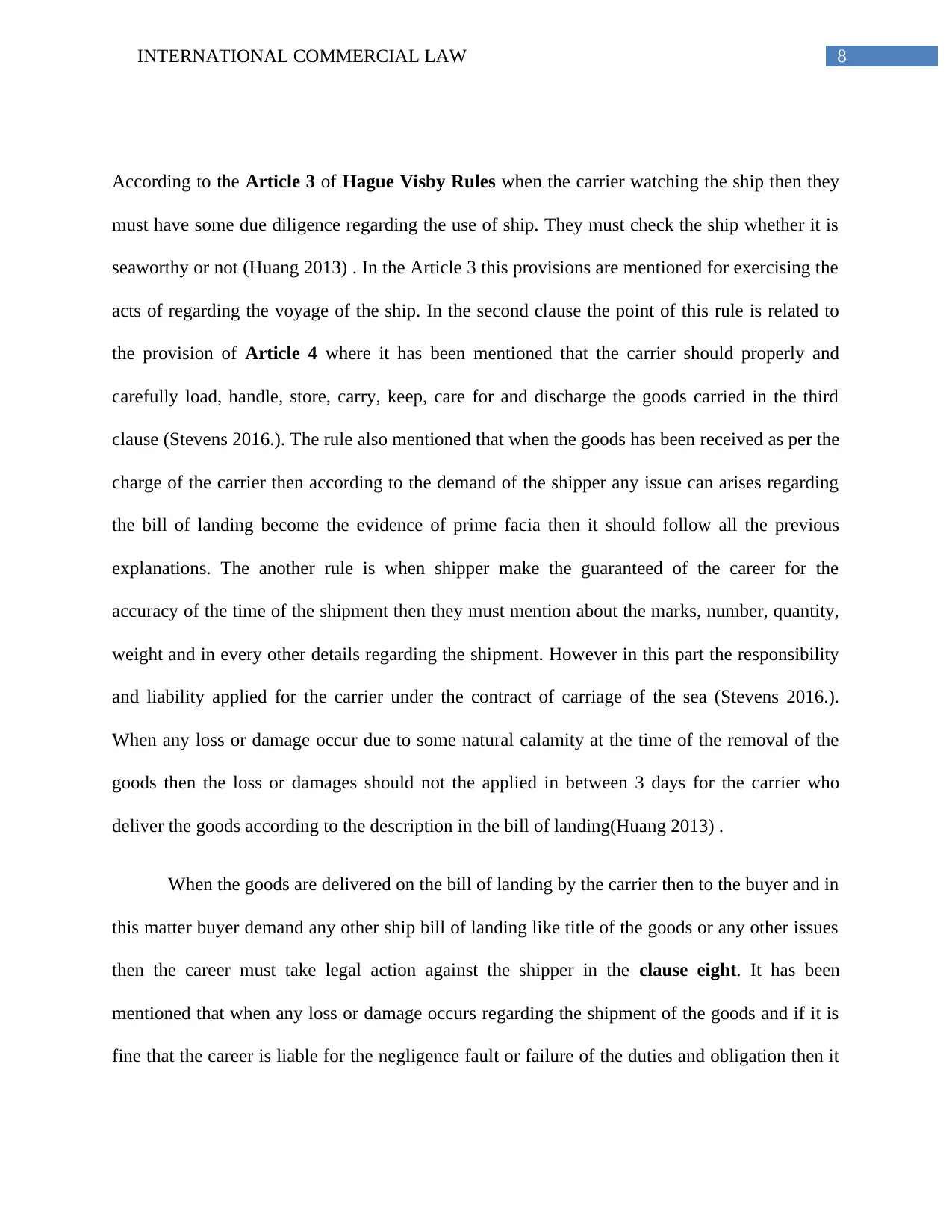
8INTERNATIONAL COMMERCIAL LAW
According to the Article 3 of Hague Visby Rules when the carrier watching the ship then they
must have some due diligence regarding the use of ship. They must check the ship whether it is
seaworthy or not (Huang 2013) . In the Article 3 this provisions are mentioned for exercising the
acts of regarding the voyage of the ship. In the second clause the point of this rule is related to
the provision of Article 4 where it has been mentioned that the carrier should properly and
carefully load, handle, store, carry, keep, care for and discharge the goods carried in the third
clause (Stevens 2016.). The rule also mentioned that when the goods has been received as per the
charge of the carrier then according to the demand of the shipper any issue can arises regarding
the bill of landing become the evidence of prime facia then it should follow all the previous
explanations. The another rule is when shipper make the guaranteed of the career for the
accuracy of the time of the shipment then they must mention about the marks, number, quantity,
weight and in every other details regarding the shipment. However in this part the responsibility
and liability applied for the carrier under the contract of carriage of the sea (Stevens 2016.).
When any loss or damage occur due to some natural calamity at the time of the removal of the
goods then the loss or damages should not the applied in between 3 days for the carrier who
deliver the goods according to the description in the bill of landing(Huang 2013) .
When the goods are delivered on the bill of landing by the carrier then to the buyer and in
this matter buyer demand any other ship bill of landing like title of the goods or any other issues
then the career must take legal action against the shipper in the clause eight. It has been
mentioned that when any loss or damage occurs regarding the shipment of the goods and if it is
fine that the career is liable for the negligence fault or failure of the duties and obligation then it
According to the Article 3 of Hague Visby Rules when the carrier watching the ship then they
must have some due diligence regarding the use of ship. They must check the ship whether it is
seaworthy or not (Huang 2013) . In the Article 3 this provisions are mentioned for exercising the
acts of regarding the voyage of the ship. In the second clause the point of this rule is related to
the provision of Article 4 where it has been mentioned that the carrier should properly and
carefully load, handle, store, carry, keep, care for and discharge the goods carried in the third
clause (Stevens 2016.). The rule also mentioned that when the goods has been received as per the
charge of the carrier then according to the demand of the shipper any issue can arises regarding
the bill of landing become the evidence of prime facia then it should follow all the previous
explanations. The another rule is when shipper make the guaranteed of the career for the
accuracy of the time of the shipment then they must mention about the marks, number, quantity,
weight and in every other details regarding the shipment. However in this part the responsibility
and liability applied for the carrier under the contract of carriage of the sea (Stevens 2016.).
When any loss or damage occur due to some natural calamity at the time of the removal of the
goods then the loss or damages should not the applied in between 3 days for the carrier who
deliver the goods according to the description in the bill of landing(Huang 2013) .
When the goods are delivered on the bill of landing by the carrier then to the buyer and in
this matter buyer demand any other ship bill of landing like title of the goods or any other issues
then the career must take legal action against the shipper in the clause eight. It has been
mentioned that when any loss or damage occurs regarding the shipment of the goods and if it is
fine that the career is liable for the negligence fault or failure of the duties and obligation then it
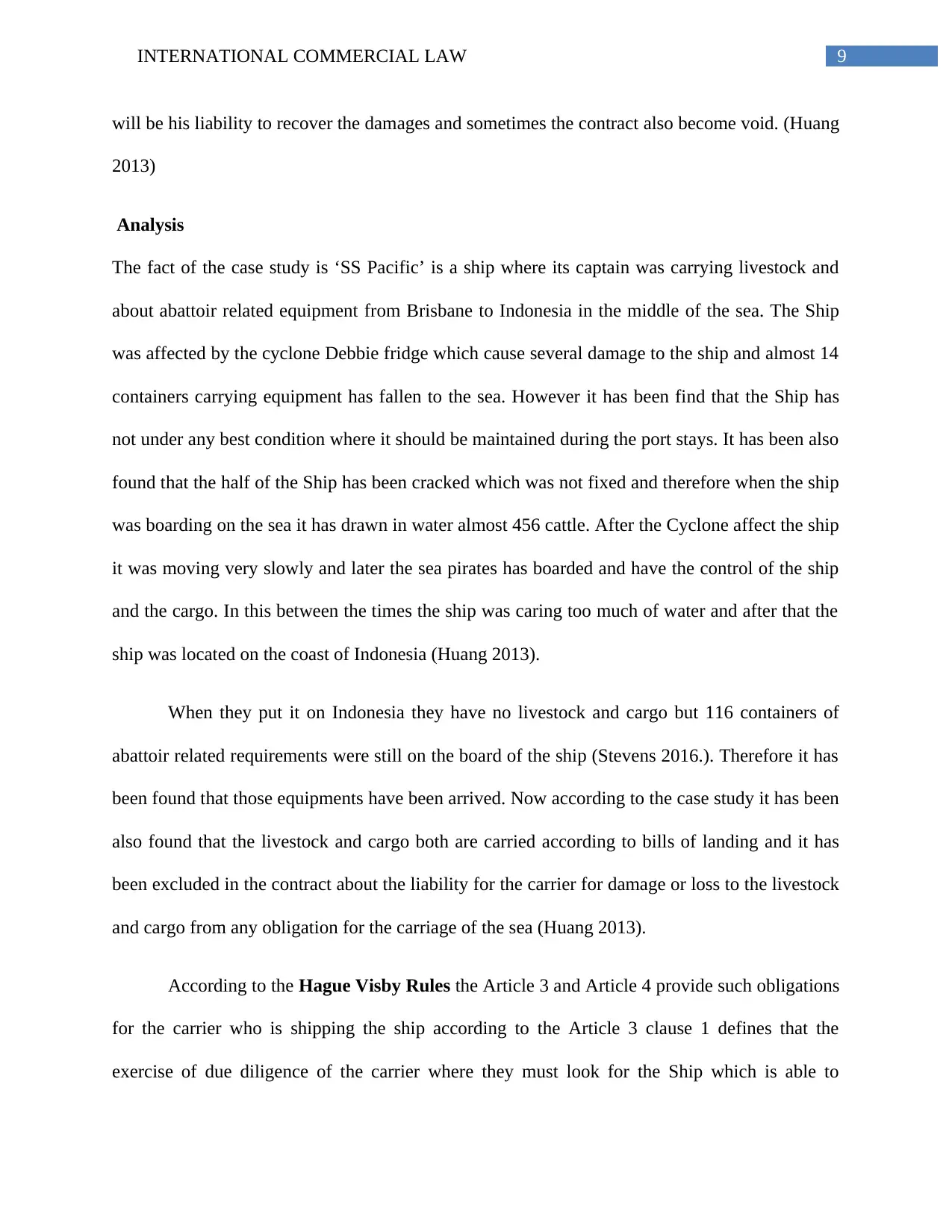
9INTERNATIONAL COMMERCIAL LAW
will be his liability to recover the damages and sometimes the contract also become void. (Huang
2013)
Analysis
The fact of the case study is ‘SS Pacific’ is a ship where its captain was carrying livestock and
about abattoir related equipment from Brisbane to Indonesia in the middle of the sea. The Ship
was affected by the cyclone Debbie fridge which cause several damage to the ship and almost 14
containers carrying equipment has fallen to the sea. However it has been find that the Ship has
not under any best condition where it should be maintained during the port stays. It has been also
found that the half of the Ship has been cracked which was not fixed and therefore when the ship
was boarding on the sea it has drawn in water almost 456 cattle. After the Cyclone affect the ship
it was moving very slowly and later the sea pirates has boarded and have the control of the ship
and the cargo. In this between the times the ship was caring too much of water and after that the
ship was located on the coast of Indonesia (Huang 2013).
When they put it on Indonesia they have no livestock and cargo but 116 containers of
abattoir related requirements were still on the board of the ship (Stevens 2016.). Therefore it has
been found that those equipments have been arrived. Now according to the case study it has been
also found that the livestock and cargo both are carried according to bills of landing and it has
been excluded in the contract about the liability for the carrier for damage or loss to the livestock
and cargo from any obligation for the carriage of the sea (Huang 2013).
According to the Hague Visby Rules the Article 3 and Article 4 provide such obligations
for the carrier who is shipping the ship according to the Article 3 clause 1 defines that the
exercise of due diligence of the carrier where they must look for the Ship which is able to
will be his liability to recover the damages and sometimes the contract also become void. (Huang
2013)
Analysis
The fact of the case study is ‘SS Pacific’ is a ship where its captain was carrying livestock and
about abattoir related equipment from Brisbane to Indonesia in the middle of the sea. The Ship
was affected by the cyclone Debbie fridge which cause several damage to the ship and almost 14
containers carrying equipment has fallen to the sea. However it has been find that the Ship has
not under any best condition where it should be maintained during the port stays. It has been also
found that the half of the Ship has been cracked which was not fixed and therefore when the ship
was boarding on the sea it has drawn in water almost 456 cattle. After the Cyclone affect the ship
it was moving very slowly and later the sea pirates has boarded and have the control of the ship
and the cargo. In this between the times the ship was caring too much of water and after that the
ship was located on the coast of Indonesia (Huang 2013).
When they put it on Indonesia they have no livestock and cargo but 116 containers of
abattoir related requirements were still on the board of the ship (Stevens 2016.). Therefore it has
been found that those equipments have been arrived. Now according to the case study it has been
also found that the livestock and cargo both are carried according to bills of landing and it has
been excluded in the contract about the liability for the carrier for damage or loss to the livestock
and cargo from any obligation for the carriage of the sea (Huang 2013).
According to the Hague Visby Rules the Article 3 and Article 4 provide such obligations
for the carrier who is shipping the ship according to the Article 3 clause 1 defines that the
exercise of due diligence of the carrier where they must look for the Ship which is able to
Secure Best Marks with AI Grader
Need help grading? Try our AI Grader for instant feedback on your assignments.
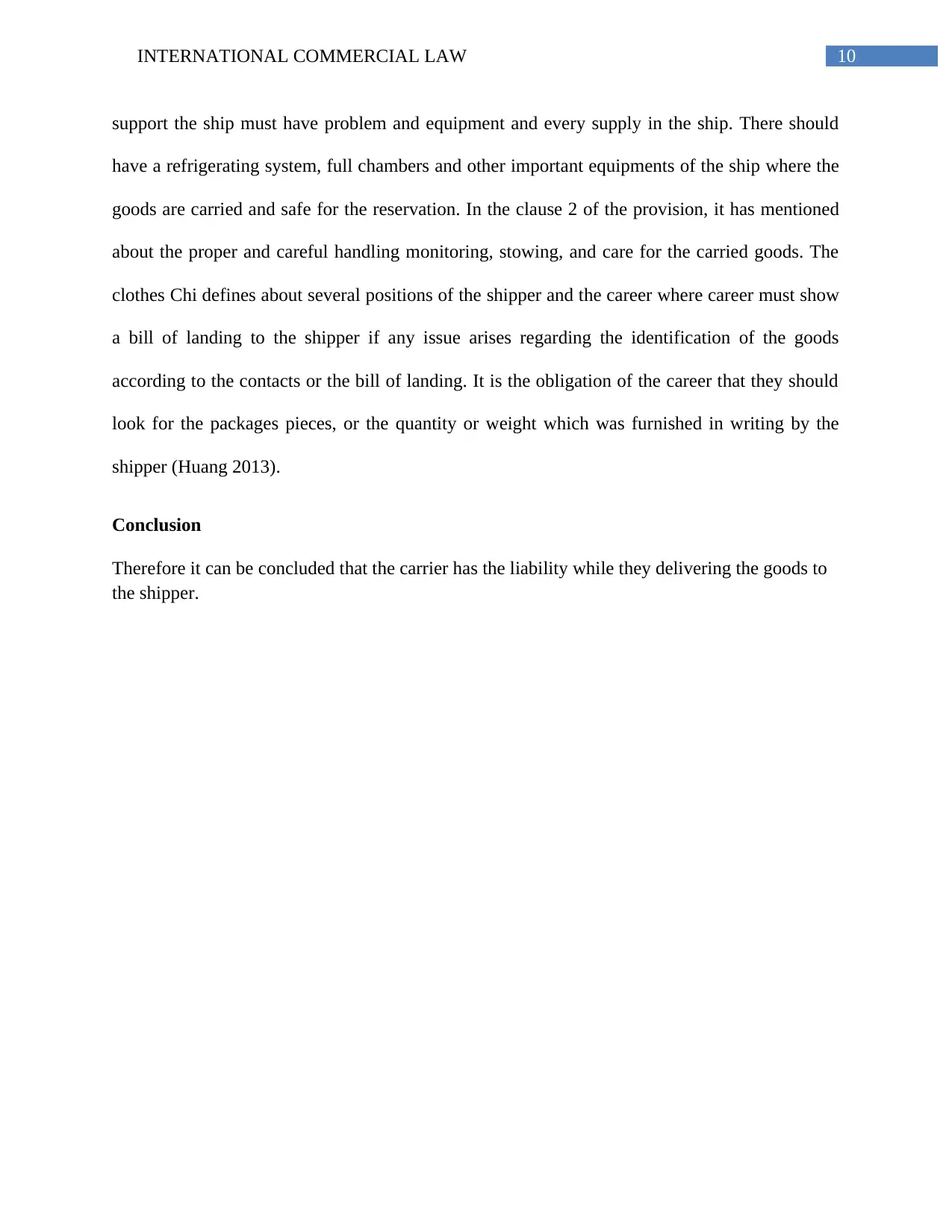
10INTERNATIONAL COMMERCIAL LAW
support the ship must have problem and equipment and every supply in the ship. There should
have a refrigerating system, full chambers and other important equipments of the ship where the
goods are carried and safe for the reservation. In the clause 2 of the provision, it has mentioned
about the proper and careful handling monitoring, stowing, and care for the carried goods. The
clothes Chi defines about several positions of the shipper and the career where career must show
a bill of landing to the shipper if any issue arises regarding the identification of the goods
according to the contacts or the bill of landing. It is the obligation of the career that they should
look for the packages pieces, or the quantity or weight which was furnished in writing by the
shipper (Huang 2013).
Conclusion
Therefore it can be concluded that the carrier has the liability while they delivering the goods to
the shipper.
support the ship must have problem and equipment and every supply in the ship. There should
have a refrigerating system, full chambers and other important equipments of the ship where the
goods are carried and safe for the reservation. In the clause 2 of the provision, it has mentioned
about the proper and careful handling monitoring, stowing, and care for the carried goods. The
clothes Chi defines about several positions of the shipper and the career where career must show
a bill of landing to the shipper if any issue arises regarding the identification of the goods
according to the contacts or the bill of landing. It is the obligation of the career that they should
look for the packages pieces, or the quantity or weight which was furnished in writing by the
shipper (Huang 2013).
Conclusion
Therefore it can be concluded that the carrier has the liability while they delivering the goods to
the shipper.
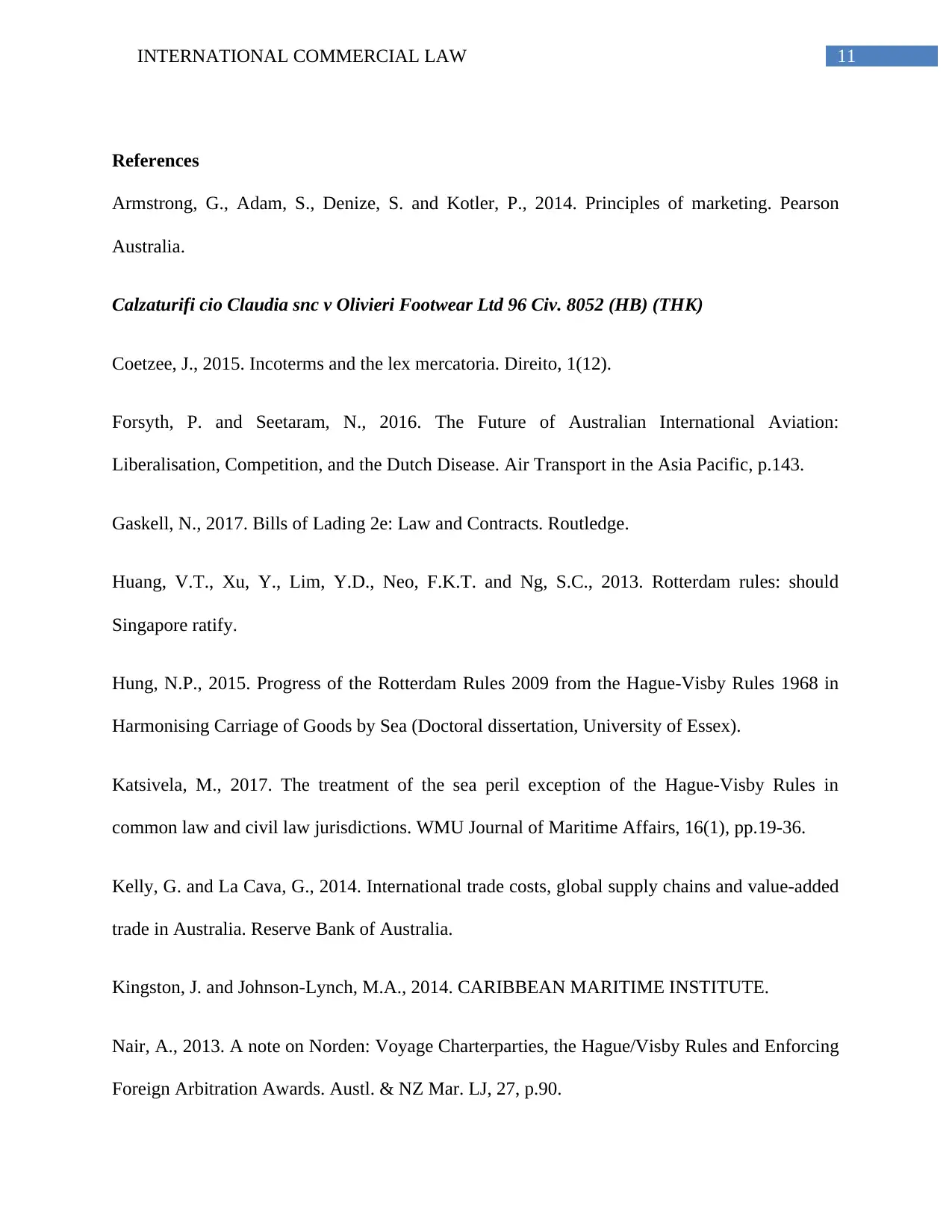
11INTERNATIONAL COMMERCIAL LAW
References
Armstrong, G., Adam, S., Denize, S. and Kotler, P., 2014. Principles of marketing. Pearson
Australia.
Calzaturifi cio Claudia snc v Olivieri Footwear Ltd 96 Civ. 8052 (HB) (THK)
Coetzee, J., 2015. Incoterms and the lex mercatoria. Direito, 1(12).
Forsyth, P. and Seetaram, N., 2016. The Future of Australian International Aviation:
Liberalisation, Competition, and the Dutch Disease. Air Transport in the Asia Pacific, p.143.
Gaskell, N., 2017. Bills of Lading 2e: Law and Contracts. Routledge.
Huang, V.T., Xu, Y., Lim, Y.D., Neo, F.K.T. and Ng, S.C., 2013. Rotterdam rules: should
Singapore ratify.
Hung, N.P., 2015. Progress of the Rotterdam Rules 2009 from the Hague-Visby Rules 1968 in
Harmonising Carriage of Goods by Sea (Doctoral dissertation, University of Essex).
Katsivela, M., 2017. The treatment of the sea peril exception of the Hague-Visby Rules in
common law and civil law jurisdictions. WMU Journal of Maritime Affairs, 16(1), pp.19-36.
Kelly, G. and La Cava, G., 2014. International trade costs, global supply chains and value-added
trade in Australia. Reserve Bank of Australia.
Kingston, J. and Johnson-Lynch, M.A., 2014. CARIBBEAN MARITIME INSTITUTE.
Nair, A., 2013. A note on Norden: Voyage Charterparties, the Hague/Visby Rules and Enforcing
Foreign Arbitration Awards. Austl. & NZ Mar. LJ, 27, p.90.
References
Armstrong, G., Adam, S., Denize, S. and Kotler, P., 2014. Principles of marketing. Pearson
Australia.
Calzaturifi cio Claudia snc v Olivieri Footwear Ltd 96 Civ. 8052 (HB) (THK)
Coetzee, J., 2015. Incoterms and the lex mercatoria. Direito, 1(12).
Forsyth, P. and Seetaram, N., 2016. The Future of Australian International Aviation:
Liberalisation, Competition, and the Dutch Disease. Air Transport in the Asia Pacific, p.143.
Gaskell, N., 2017. Bills of Lading 2e: Law and Contracts. Routledge.
Huang, V.T., Xu, Y., Lim, Y.D., Neo, F.K.T. and Ng, S.C., 2013. Rotterdam rules: should
Singapore ratify.
Hung, N.P., 2015. Progress of the Rotterdam Rules 2009 from the Hague-Visby Rules 1968 in
Harmonising Carriage of Goods by Sea (Doctoral dissertation, University of Essex).
Katsivela, M., 2017. The treatment of the sea peril exception of the Hague-Visby Rules in
common law and civil law jurisdictions. WMU Journal of Maritime Affairs, 16(1), pp.19-36.
Kelly, G. and La Cava, G., 2014. International trade costs, global supply chains and value-added
trade in Australia. Reserve Bank of Australia.
Kingston, J. and Johnson-Lynch, M.A., 2014. CARIBBEAN MARITIME INSTITUTE.
Nair, A., 2013. A note on Norden: Voyage Charterparties, the Hague/Visby Rules and Enforcing
Foreign Arbitration Awards. Austl. & NZ Mar. LJ, 27, p.90.
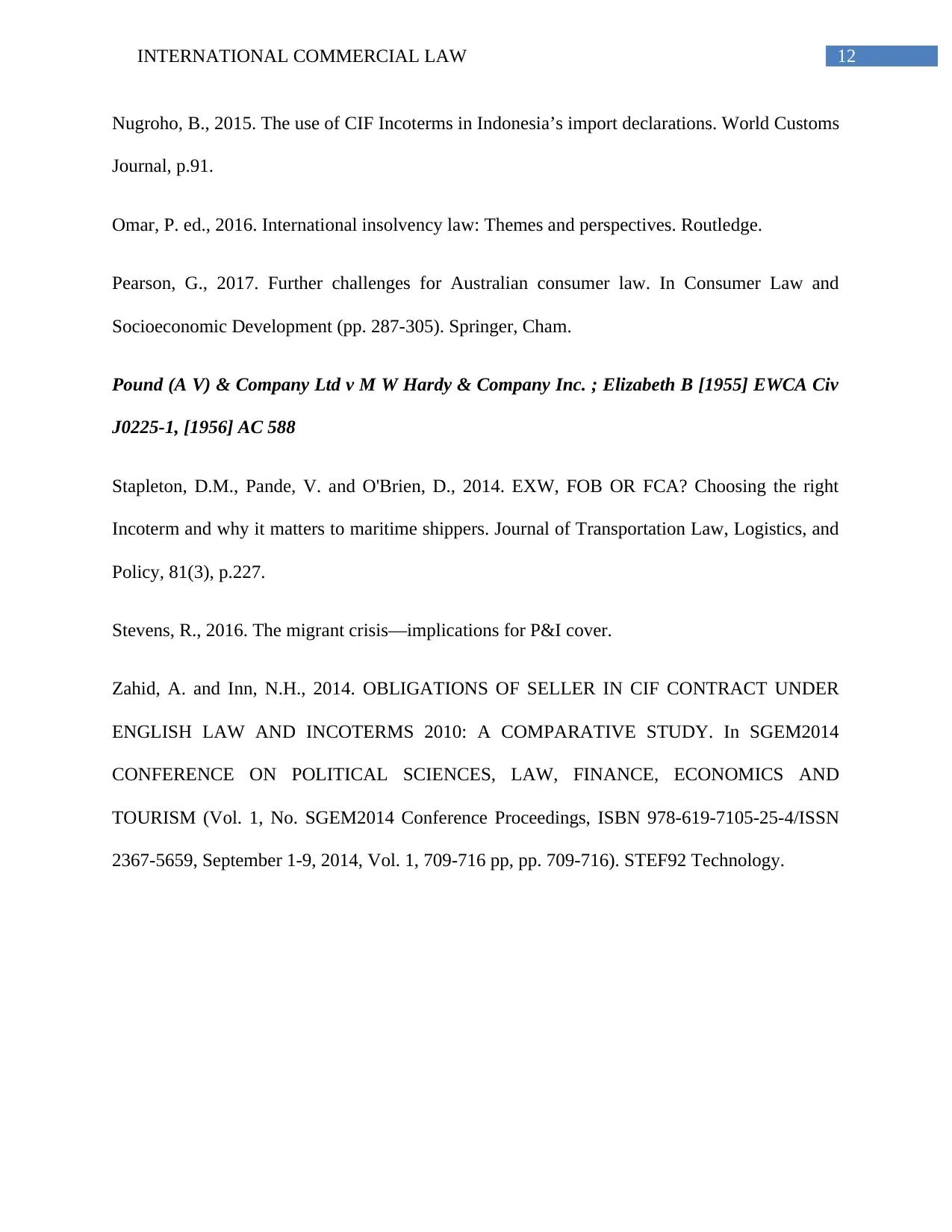
12INTERNATIONAL COMMERCIAL LAW
Nugroho, B., 2015. The use of CIF Incoterms in Indonesia’s import declarations. World Customs
Journal, p.91.
Omar, P. ed., 2016. International insolvency law: Themes and perspectives. Routledge.
Pearson, G., 2017. Further challenges for Australian consumer law. In Consumer Law and
Socioeconomic Development (pp. 287-305). Springer, Cham.
Pound (A V) & Company Ltd v M W Hardy & Company Inc. ; Elizabeth B [1955] EWCA Civ
J0225-1, [1956] AC 588
Stapleton, D.M., Pande, V. and O'Brien, D., 2014. EXW, FOB OR FCA? Choosing the right
Incoterm and why it matters to maritime shippers. Journal of Transportation Law, Logistics, and
Policy, 81(3), p.227.
Stevens, R., 2016. The migrant crisis—implications for P&I cover.
Zahid, A. and Inn, N.H., 2014. OBLIGATIONS OF SELLER IN CIF CONTRACT UNDER
ENGLISH LAW AND INCOTERMS 2010: A COMPARATIVE STUDY. In SGEM2014
CONFERENCE ON POLITICAL SCIENCES, LAW, FINANCE, ECONOMICS AND
TOURISM (Vol. 1, No. SGEM2014 Conference Proceedings, ISBN 978-619-7105-25-4/ISSN
2367-5659, September 1-9, 2014, Vol. 1, 709-716 pp, pp. 709-716). STEF92 Technology.
Nugroho, B., 2015. The use of CIF Incoterms in Indonesia’s import declarations. World Customs
Journal, p.91.
Omar, P. ed., 2016. International insolvency law: Themes and perspectives. Routledge.
Pearson, G., 2017. Further challenges for Australian consumer law. In Consumer Law and
Socioeconomic Development (pp. 287-305). Springer, Cham.
Pound (A V) & Company Ltd v M W Hardy & Company Inc. ; Elizabeth B [1955] EWCA Civ
J0225-1, [1956] AC 588
Stapleton, D.M., Pande, V. and O'Brien, D., 2014. EXW, FOB OR FCA? Choosing the right
Incoterm and why it matters to maritime shippers. Journal of Transportation Law, Logistics, and
Policy, 81(3), p.227.
Stevens, R., 2016. The migrant crisis—implications for P&I cover.
Zahid, A. and Inn, N.H., 2014. OBLIGATIONS OF SELLER IN CIF CONTRACT UNDER
ENGLISH LAW AND INCOTERMS 2010: A COMPARATIVE STUDY. In SGEM2014
CONFERENCE ON POLITICAL SCIENCES, LAW, FINANCE, ECONOMICS AND
TOURISM (Vol. 1, No. SGEM2014 Conference Proceedings, ISBN 978-619-7105-25-4/ISSN
2367-5659, September 1-9, 2014, Vol. 1, 709-716 pp, pp. 709-716). STEF92 Technology.
1 out of 13
Related Documents
Your All-in-One AI-Powered Toolkit for Academic Success.
+13062052269
info@desklib.com
Available 24*7 on WhatsApp / Email
![[object Object]](/_next/static/media/star-bottom.7253800d.svg)
Unlock your academic potential
© 2024 | Zucol Services PVT LTD | All rights reserved.
